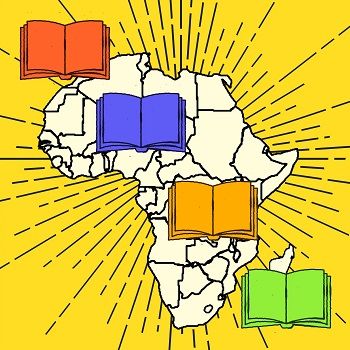Everyone is saying it: 2021 was the year for African literature. Writers from the continent scooped the Nobel, Booker, Goncourt and Camões prizes. And these honors — arguably the highest-sheen literary awards in the world — do not make up even half the list. The Neustadt, or “American Nobel,” and International Booker Prizes went to Senegalese writers, and the Peace Prize of the German Book Trade to a Zimbabwean one.
In light of this sweep, it’s fair to ask what the African books and writers feted last year by Western nations have in common. The best answer is simple: very little. The novels honored last year run a very wide gamut, of genre and style and political outlook, as well as more obvious things like nation, race and ethnicity.
That’s a good thing. While Africans don’t need to be told that no one person or book can represent a huge, culturally and linguistically diverse continent, readers from Western countries have been slow to grasp that fact. The sheer diversity of last year’s winners — from Damon Galgut’s Booker Prize-winning South African farm novel “The Promise” to the Nobel laureate Abdulrazak Gurnah’s subtle examinations of emigrant Zanzibari life — puts the point beyond any doubt.

The tantalizingly wide range of these books should encourage us to read more, of course, but also to read better. It’s an invitation to set aside preconceptions — about what sort of story should come from where and how it should be told — and instead to step into the richly drawn interior worlds of Africans who are themselves still figuring out what to make of their histories.
Take the work of Mr. Gurnah, whose award of the Nobel Prize took many people by surprise. They clearly hadn’t read “Paradise,” which traverses centuries-old trade routes between Tanzania and Central Africa. Or “By the Sea,” which moves among multiple narrators to explore how selfhood, under the pressure of migration, flickers in and out of legibility. By tracing the lasting psychic imprint of Zanzibari life on people who end up far from home, Mr. Gurnah goes well beyond the history of Western colonization with which most readers may be more familiar, offering up a body of work at once revelatory and restrained.
That’s not to say many novels recognized last year eschewed the subject. Many focus in some way on the violent legacies of European colonialism. But the insights and approaches are far from conventional. David Diop’s International Booker-winning “At Night All Blood Is Black,” for example, is about the largely forgotten history of French African soldiers in World War I. Yet it is also a gritty exercise in expressing paranoia and mental anguish through what seems, at first, like a straightforward narration of events. Through one man’s isolated rituals, captured in blood-soaked prose, Mr. Diop draws the reader into collective trauma.
In this way Mr. Diop asks readers both to learn about new things and to feel them — surely two of the major reasons most people read any work of fiction. What he does not do is offer an easy way to connect these effects to a broader idea of Africa, and that’s where things get more interesting. By holding open the experiences it recounts without predetermination, the book asks the reader to do the same. For Western readers, long fed on mistaken impressions of what Africa is, maintaining openness and humility can acquire a radical power.
The elephant in the room is always, well, the elephant: a vision of Africa as wild, exotic and unmodern. And because African writers are also aware of the odds stacked against them by long histories of bad representation, the best African literature builds this kind of purposeful openness into itself. It carefully balances the universal with the particular or the local with the global in order to do justice to real places without abandoning claims to art for its own sake. Many of the most pleasurable and achieved African novels published in 2021 wed cultural recovery to creative abundance especially well, building new worlds from deep roots.
The South African writer Mphuthumi Ntabeni’s “The Wanderers” is a good example. It moves deftly between deep knowledge of 19th-century divisions among Xhosa people and contemplation of how its main character, in grieving the loss of a father she never knew, finds new forms of cross-generational intimacy. Siphiwe Gloria Ndlovu’s “The History of Man,” out in 2020 in South Africa but forthcoming in America, similarly braids the social and the personal. Her style is deceptively simple as she describes the great mysteries of how we come to be who we are. Through the figure of Emil, a white man on the wrong side of Zimbabwean liberation history, she paints a fine-grained portrait of lost forms of Rhodesian city life.
To read these books in the spirit of openness is to take them seriously as literature rather than as flat texts either telling us what we already know or confirming the false idea that Africa is unknowable. The long history of racist tokenization makes this more difficult to do — but the rewards are well worth the effort. From Nigeria’s madcap styling in T.J. Benson’s debut novel, “The Madhouse,” to Jennifer Nansubuga Makumbi’s taboo-breaking rendition of a Ugandan girls’ boarding school in “The First Woman,” the top-notch African writing published last year entertains at least as much as it instructs.
African literature’s big year is a reckoning. For too long, the major Western awards have ignored the sure-footed, endlessly inventive work coming out of the continent, and even award winners encounter a publishing world skewed against them. But it’s also, more profoundly and pleasurably, an invitation to readers to open themselves up to African fiction’s many variations — and see what new strands of connection they might find.
Jeanne-Marie Jackson is an associate professor of English at Johns Hopkins University and an Andrew Carnegie fellow. She is the author of The African Novel of Ideas.
